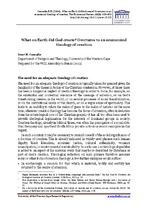| dc.description.abstract | The need for an adequate theology of creation is typically taken for granted given the familiarity of the theme in terms of the Christian confession. However, at times there has been a dangerous neglect of creation theology in order to focus, for example, on the existential and contextual relevance of the message of salvation, or on God’s transforming mission in the world, or on secular processes of social transformation, or on the institutional needs of the church, or on a vague sense of spirituality. This leads to an inability to relate the realm of grace to the realm of nature. At the same time, wherever creation theology has become the focus of attention, often in isolation from the soteriological core of the Christian gospel, it has all too often been used to provide ideological legitimation for the interests of dominant groups in society. Creation theology, already in biblical times, was often the prerogative of a royal elite. Nazi Germany and apartheid South Africa provide notorious recent examples in this regard. In such a context it may be necessary to remind oneself of the social significance of a doctrine of creation. This is already indicated in widely used phrases such human dignity, black liberation, economic justice, cultural authenticity, women’s emancipation, or environ¬mental sustainability. In each case a soteriological qualifier is added to an aspect of the material world that may be re-described by Christians as part of God’s creation. Theological reflection on such phrases therefore assumes some or other form of creation theology. | en_US |

